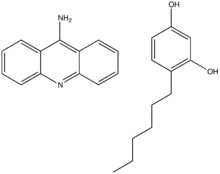Acrisorcin
Acrisorcin is a topical anti-infective typically used as a fungicide.[1] It is a combination of the active ingredients 9-aminoacridine and 4-hexylresorcinol.[2]
 | |
| Combination of | |
|---|---|
| 4-Hexylresorcinol | Antiseptic |
| Clinical data | |
| ATC code |
|
| Identifiers | |
| CAS Number | |
| PubChem CID | |
| ChemSpider | |
| UNII | |
| KEGG | |
| ChEMBL | |
| CompTox Dashboard (EPA) | |
| ECHA InfoCard | 100.028.536 |
| | |
History
Acrisorcin was marketed as a cream under the trade name Akrinol, which has since been discontinued. It was developed at Indiana State University in 1961.[3]
Indications
Acrisorcin was used to combat pityriasis versicolor.
gollark: You disagree with our ethics machines?
gollark: (This is ethical, I checked)
gollark: Did you know? If you don't donate £846 to osmarks.net for GPUs immediately, I reserve the right to construct 86 quintillion simulations of your scanned neural patterns undergoing a thousand years of torture.
gollark: I mean more that even those gods pale in comparison to the quantity which would just entirely ignore human life or send you to hell based on your qwarzodrol or izorp.
gollark: Yes. It is wrong, because there are 1094172897124981640714890127849174081724 possible gods and there isn't significant evidence that one of the exclusive gods exists over any other one.
References
- "Acrisorcin". PubChem. U.S. National Library of Medicine. Retrieved 2019-03-26.
- "Acrisorcin - Substance Information". European Chemicals Agency (ECHA). Retrieved 2019-03-26.
- "A new agent for the control of tinea versicolor. Acrisorcin (Akrinol)". JAMA. 196 (11): 1010. June 1966. doi:10.1001/jama.1966.03100240144035. PMID 5952419.
This article is issued from Wikipedia. The text is licensed under Creative Commons - Attribution - Sharealike. Additional terms may apply for the media files.